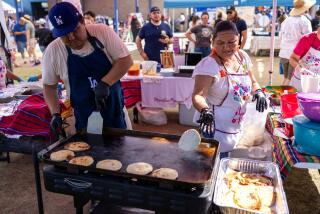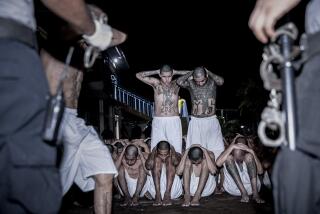Activists Seek Aid for Inmates in El Salvador
Community activists Wednesday urged support for thousands of prisoners in El Salvador’s overcrowded penal system, including Los Angeles deportees, who have staged hunger strikes to protest alleged rights abuses and lack of basic services.
Silvia Beltran, executive director of Homies Unidos, a gang prevention and intervention organization with offices in Los Angeles and El Salvador, said increased deportations by U.S. authorities and tough law enforcement crackdowns in El Salvador and other Central American countries are “promoting repression” of prisoners without dealing with the root causes of crime and migration.
Beltran was joined by other speakers at a news conference outside the Salvadoran Consulate in Los Angeles. They blamed the deportations and crackdowns south of the border for filling prisons in El Salvador, where inmates allegedly are tortured and denied food, medical care and family visits.
“We’re asking that they be treated like persons, not animals,” said Ana Rivera de Leon, whose 23-year-son was deported from Los Angeles last month. After he was involved in a traffic accident in El Salvador, she said, he was incarcerated solely because he had tattoos.
De Leon alleged that her son, one of more than 3,000 hunger strikers, was beaten by prison guards for joining the protest.
“It hurts me because he is my son,” said De Leon, who cleans homes and works as a nanny to help support her family.
A spokesman for El Salvador’s national prison system, Alberto Uribe, said Wednesday that he was not aware of a single report of guards abusing prisoners. The real threat inside the 14,000-inmate system is violence by prisoners, he said. In the last year, he said, gang members allegedly ordered the executions of 16 guards and a prison warden, who was shot outside his home last month.
“What about their human rights?” Uribe asked.
The news conference underscored the growing connections between government policies in Central America and the United States and the effects on families, especially in Los Angeles, home to one of the largest Salvadoran communities in the country.
Since 1993, U.S. authorities have deported more than 150,000 Central American immigrants. About a third had criminal records. In response to street violence partially attributed by police to deported gang members, governments in El Salvador, Honduras and Guatemala have made thousands of arrests in the last several years.
The crackdowns have not only prompted human rights complaints but are blamed for pushing many gang members back to the United States.
The director of the Salvadoran prison system, Astor Escalante, said in a recent interview that his 19 prisons are overcrowded and underfunded. They struggle with corrupt guards who smuggle in drugs and cellphones for inmates, he said.
Escalante met with hunger strikers in recent days and agreed to some changes, including increased visiting rights and more attention to medical and psychological needs. The strikers, some of whom were hospitalized, suspended their protest Tuesday, officials said.
The U.S. State Department, in its most recent report on El Salvador, cited the continuing poor conditions in the nation’s prisons.
“Overcrowding constituted a serious threat to prisoners’ health and lives,” the report said.
More to Read
Sign up for Essential California
The most important California stories and recommendations in your inbox every morning.
You may occasionally receive promotional content from the Los Angeles Times.










